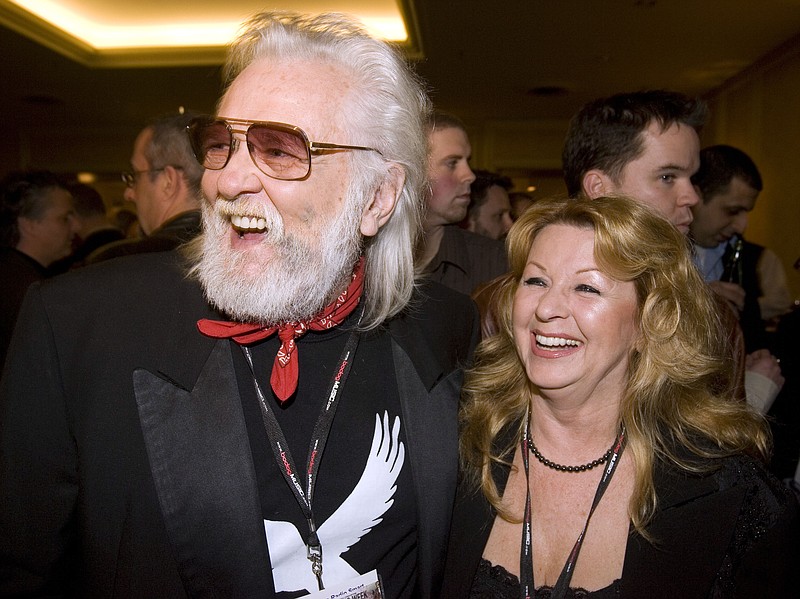Rock and roll pioneer Ronnie Hawkins died Sunday, said his wife Wanda.
Hawkins, who had diabetes for about 20 years, went downhill over the last few days, his wife told the Arkansas Democrat-Gazette.
He was 87.
Hawkins -- who grew up in Huntsville and Fayetteville -- is primarily known for starting the group The Hawks, which later became The Band.
"For an old ignorant country boy from Arkansas, I certainly had a good time," Hawkins told the Arkansas Democrat-Gazette in 2018. "My timing was good. I met Johnny Cash while he was trying to sell cars and Carl Perkins when he didn't have a job."
With Hawkins as lead singer, The Hawks had a minor hit with "Mary Lou," which reached No. 26 on Billboard's Top 40 in 1959. "Forty Days," Hawkins' reworking of Chuck Berry's "Thirty Days," reached No. 45 on the chart that same year.
"Rockabilly was two pay grades below a prisoner of war," Hawkins told the newspaper. "Nobody liked it but younger people."
Later, he would have considerably more fame in Canada.
Ronald Cornett (Ronnie) Hawkins was born on Jan. 10, 1935, in Huntsville, according to the Encyclopedia of Arkansas.
His father, Jasper Hawkins, was a barber, and his mother, Flora Cornett Hawkins, was a schoolteacher.
In 1945, the family, which included Hawkins's older sister Winifred, moved to Fayetteville. Ronnie Hawkins graduated from Fayetteville High School in 1952.
Hawkins formed his first bands during his high school and college years.
A physical education major at the University of Arkansas in Fayetteville, Hawkins developed an outrageous stage persona that earned him the nicknames "Rompin' Ronnie" and "Mr. Dynamo," according to the encyclopedia entry.
"I did the camel walk -- which Michael Jackson called the moon walk -- in 1948, when I was in the eighth grade," Hawkins told the Democrat-Gazette in 2018.
Hawkins dropped out of college in 1956 and joined the Army. When he got out, he moved to Helena and started putting together a touring band that included Levon Helm of Marvell.
At the suggestion of Harold Jenkins of Helena (later known as Conway Twitty), the group headed for Canada in 1958 and found audiences there hungry for American rock and roll.
As some Arkansans dropped out of The Hawks, Hawkins added Canadians Rick Danko, Garth Hudson, Richard Manuel and Robbie Robertson to the group, while retaining Helm on drums.
In the early 1960s, Hawkins owned The Rockwood Club in Fayetteville, and his band split its time between Canada and Fayetteville.
In 1963, the group left Hawkins to venture out on their own.
Bob Dylan hired them for his U.S. tour in 1965 and his world tour in 1966, where the musicians performed electric music for audiences that didn't always appreciate it.
The Band, apart from Dylan, would eventually record such classics as "The Weight," "The Night They Drove Old Dixie Down" and "Up on Cripple Creek."
The Last Waltz, Martin Scorcese's 1978 documentary, captures the group at its zenith, according to the Arkansas Encyclopedia. Hawkins performed a version of Bo Diddley's "Who Do You Love?" in the film.
Hawkins remained in Canada for most of his life.
"Canada has been the promised land for me," he told the Democrat-Gazette.
"Hawkins was godfather to a generation of influential artists," according to The Globe and Mail of Canada.
In Canada, Hawkins was awarded the 1982 Juno Award, equivalent to an American Grammy, as Best Male Country Vocalist, according to the encyclopedia. In 1996, he was presented the Walt Grealis Special Lifetime Achievement Award, one of the most esteemed honors in the Canadian music industry.
The city of Toronto proclaimed Oct. 4, 2002, as "Ronnie Hawkins Day." Hawkins was added to Canada's Walk of Fame in 2002 and inducted into the Canadian Music Industry Hall of Fame in 2004.
Always retaining his U.S. citizenship, in 2014 Hawkins accepted an honorary appointment as officer of the Order of Canada, according to CBC/Radio-Canada.
In addition to appearances as himself in The Last Waltz and Renaldo and Clara (1978), Hawkins had minor movie roles, including Heaven's Gate (1980). He hosted his own variety series, Honky Tonk, on Canadian television during the 1981–82 season.
Hawkins lived with his wife Wanda in Peterborough, Ontario, Canada. They have three grown children: Ronnie Jr., Robin, and Leah.
In 2002, Hawkins was diagnosed with pancreatic cancer and was not expected to survive, according to the encyclopedia. But he defied the odds against him and recovered fully. In 2002, he released a new album, Still Cruisin', to favorable reviews.
He was inducted into the Arkansas Entertainers Hall of Fame in 2008.
In 2018, Hawkins remembered when two Baptist deacons came to his door while he was a UA student in the 1950s:
"One of them said, 'Ronnie Hawkins, don't you believe in God?' I said 'Yeah, I believe in God probably more than anybody else, but I'm real leery of the ground crew, I'll tell you that. They mumbled something in a foreign tongue and left."
Gallery: Ronnie Hawkins, 1935-2022
